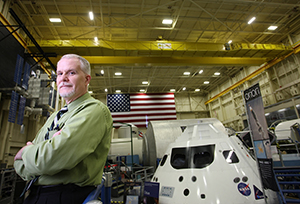Like so many other Iowa State aerospace engineering graduates, Richard Schmidgall began his career with the U.S. space program at Johnson Space Center in Houston, Texas – and never left.
The 1983 grad from Mackinaw, Ill., was first employed by McDonald Douglas and Rockwell Space Operations, both NASA contractors, before going to work directly for NASA in 1989. And until May 2011 he spent his entire career supporting the Space Shuttle program, working on trajectory abort design and later becoming the lead engineer for ascent flights on the Shuttle and deputy manager for the Space Shuttle Systems and Integration Office.
“After the Challenger accident occurred in 1986, things changed,” he said. “We developed contingency abort modes in the event we would lose two or three main engines during the ascent flight phase. We developed the capability that the crew could actually bail out of the orbiter. Luckily, we never had to do that.”
Richard said that being placed in a lead role after the Challenger accident while still early in his career is a source of pride.
“Being able to work through that and get us to the point where we could fly again was a highlight of my career.”
Richard also held a lead role in developing a system to allow the Shuttle to launch in a wider variety of wind conditions. Prior to the project, approximately 50 percent of launches were scrubbed due to wind velocity. After the new capability was implemented, he said, “we never scrubbed a launch.”
“To be a part of that project team, to ensure that we had the right safety parameters in place and do it with the quality and assurance that we would not compromise the vehicle or crew on day of launch was terribly rewarding.”
Currently, Richard is the assistant manager and contracting officer technical representative for the Orion program. Orion is NASA’s next major crew vehicle for exploration. The vehicle will be responsible for routine flights to the International Space Station as well as eventually returning to the Moon, exploring near-Earth asteroids, and – someday – Mars.

